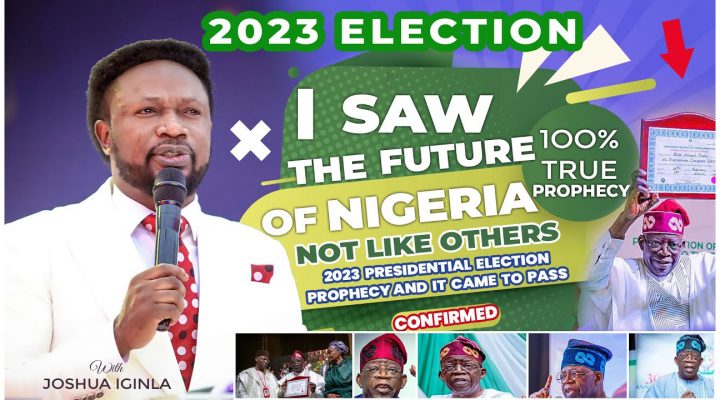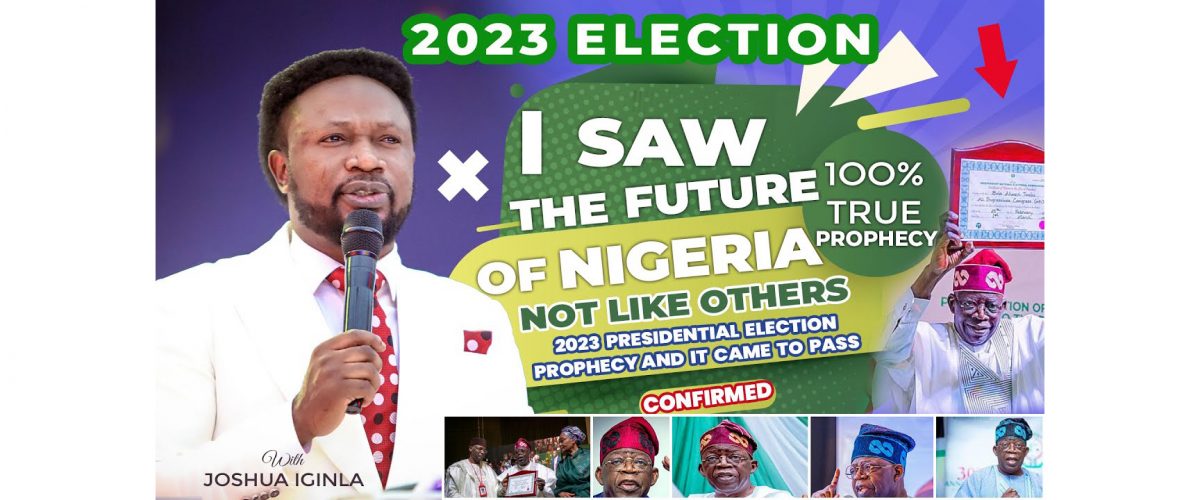Politics and prophesies go together in Nigeria, where a recent presidential election brought out religious figures speaking of divine visions.
Weeks ahead of Nigeria’s election, a video of Passion Java, a Zimbawean pastor, made the rounds. In the video, Java prophesied about the outcome of the election.

Passion Java
“In the month of February I’m going to Nigeria. We need to pray for Nigeria because I saw people dying,” he said. “It is something that has to do with the youth, and I began to see people shooting each other. I saw elections taking place in Nigeria, and the elections were not that peaceful. I even saw police getting in the streets trying to control people; I saw people trying to fight back. So we need to pray and save lives in Nigeria. So that at least the elections will be peaceful.”
He continued: “But then, people were asking, ‘Who’s going to win? Who’s gonna win? Who’s gonna win?’ And I saw a man. … Spiritually, I see a man with glasses. He’s of old age, he’s not like a youthful man, and I see him wearing glasses and I see a name as a T and I see this one getting into power. So, this election, it’s a waste of time for people to kill each other. This one with a T, I see him ruling Nigeria. So this one is already a done deal.”
The man with a T in the tale is interpreted by many to be Bola Tinubu, flagbearer of the All Progressives Congress who later was declared winner of the Feb. 25 election by the Independent National Electoral Commission.
But there’s a T in the names of two other leading candidates whom Tinubu defeated in the poll: Atiku Abubakar of the Peoples Democratic Party and Peter Obi of the Labor Party.
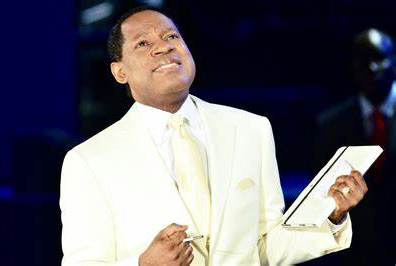
Chris Oyakhilome
In another prophetic video making the rounds, Chris Oyakhilome, one of Nigeria’s best-known Pentecostal pastors, spoke about what he called his spiritual encounter with God without mentioning names of those involved.
“I saw one of the candidates and it was not himself. By the way, all the candidates, the major candidates, each one of them is somebody I have great respect for,” he clarified. “Make no mistake about it. I like these guys. … But you have to look in the spirit, and in the spirit I saw the first one I mentioned yesterday and it was a devil, an evil spirit; a wicked spirit that was wearing his face. Meaning that he doesn’t even know what he’s doing while he’s campaigning and running for president. He’s being used. A wicked spirit of darkness, and the spirit was a mocker.”
He went on, “Today, when I was praying, as I was praying, the spirit called him a name. I was surprised. Because he said, ‘The jackal is cut off.’ I said, ‘Jackal?’ I thought I knew the meaning of jackal. I had to go into the dictionary to find what is a jackal. Why do you call him a jackal. What is a jackal? It means a trickster. A swindler and one that operates on behalf of another for the purpose of deception. That’s one.”
“The second one, I said, what about him? What about the second one? He said, if you let him get in office, you will have no country. I said, ‘Lord, we let the second one into office and we will have no country?’ He said, ‘You will have no country.’
“Then, I saw the third one. He was afraid. He was afraid he might win now. He was afraid of losing. He didn’t want to lose but he was almost scared of winning. I said, ‘Lord!’ then he said, ‘Pray.’ I said, ‘God of heaven, give him wings to fly.’”
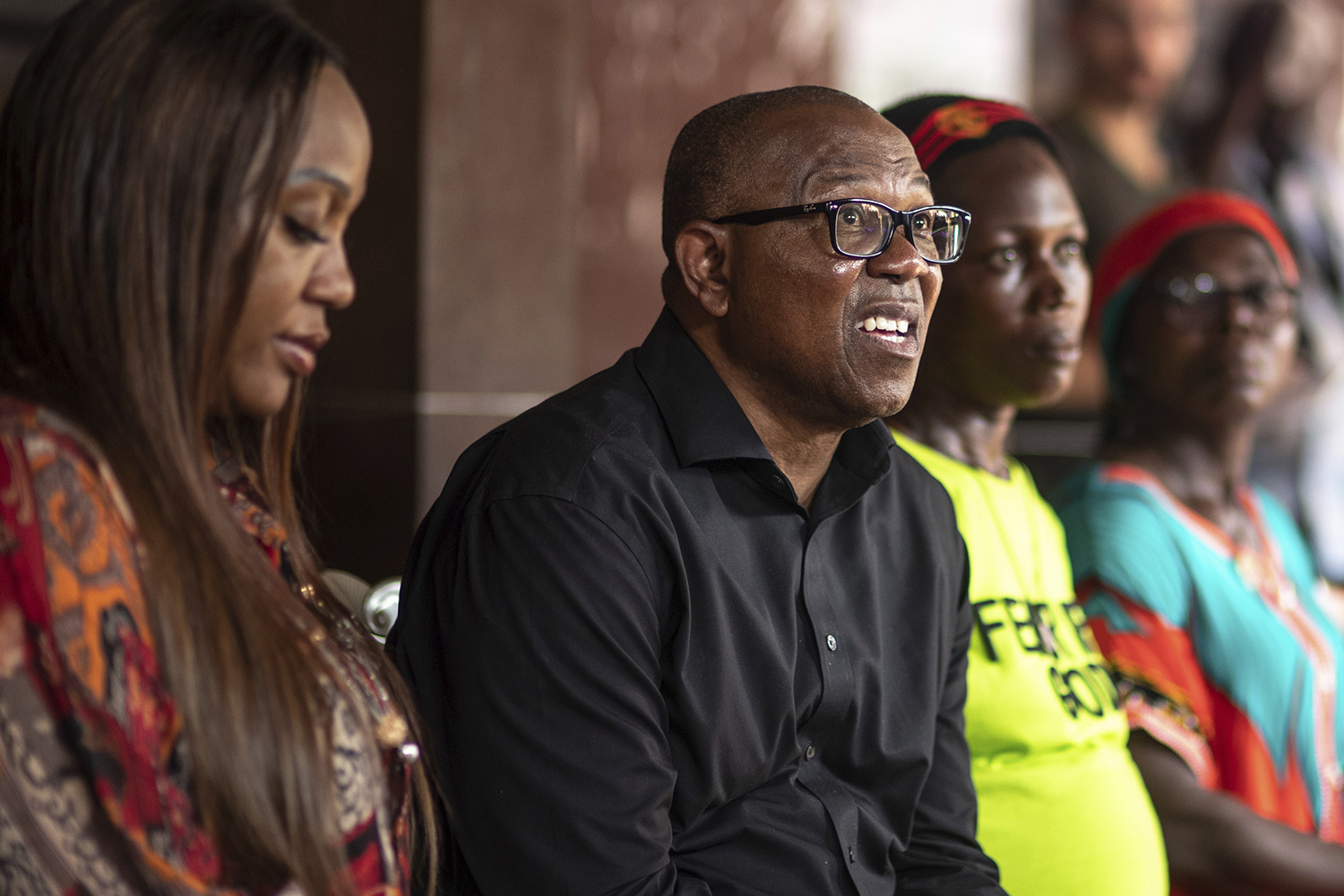
Nigeria’s Labor Party’s candidate Peter Obi sits in line with his wife Margaret Obi, left, as he waits to cast his vote during the presidential elections in Agulu, Nigeria, Feb. 25, 2023. Obi, who finished third in last month’s presidential race, has filed a petition with the Supreme Court against the ruling party for its candidate’s victory. (AP Photo/Mosa’ab Elshamy, File)
As the congregation broke into a joyous cry, Oyakhilome let the cat out of the bag: “The first one because of what he was, I won’t mention the name, neither will I mention the name of the second one. But the third one, the third one, his name is in the Bible.”
The church exploded into even greater uproar. Oyakhilome then added, “So in the spirit, I called out to him and said, ‘Why are you afraid? Why are you afraid? Why have you suddenly allowed fear to come over you?’ I said, ‘God of heaven, give him wings to fly.’”
This video was widely shared by Peter Obi’s supporters ahead of the election. And although the results didn’t favor him, he and his supporters remain hopeful as Obi has filed a lawsuit challenging the results of the election on the ground that the poll was marred by irregularities.
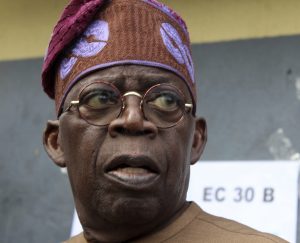
Asiwaju Bola Ahmed Tinubu, president-elect, arrives at a polling unit during the 2023 Governorship and State House of Assembly at Alausa, Ikeja, Lagos, on Saturday. (Photo by Adekunle Ajayi/NurPhoto via AP)
Java and Oyakhilome weren’t the only two Christian religious leaders who prophesied about Nigeria’s recent election.
Many others, including politicians, mouthed God in their political campaigns. On one occasion, Samuel Ortom, governor of Benue State in Nigeria’s middle belt region, claimed at a political event in his state that his pastor told him Obi would win the election.
The trend of prophesying elections results isn’t a recent occurrence. Yet these prophesies often turn out to be wrong.
Depending on how prophecies play out, people view them differently. Besides relying on prophecies, African politicians — whether Muslim or Christian — have traveled outside their countries to meet with pastors or imams or to consult with seers.
But none of this spiritual talk amounts to anything, according to Problem Masau, a Zimbabwean journalist.
“These are not genuine prophets, they are just psychologists preying on the mind of unsuspecting people,” he said. “They are just entrepreneurs who are in there for profit. Even a football fan can sometimes predict a winning bat.”
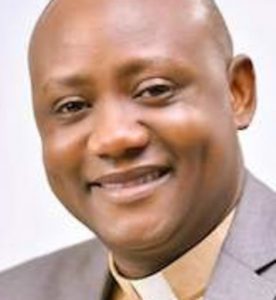
Justin Dyikuk
Justine Dyikuk, a Catholic priest and lecturer in mass communication at the University of Jos, Nigeria, also doesn’t think highly of prophetic pronouncements of pastors.
“It is laughable how some pastors in Zimbabwe and Africa banter prophesies here and there, making untenable claims,” he said. “If one is to interrogate prophesy in Africa, how come these prophesies have not changed the fortunes of a continent that is bedeviled by wars, disease, poverty and underdevelopment? Why don’t we have prophesies about upcoming pandemics and vaccines? What was the role of prophesy in the Ebola and COVID-19 pandemics? Apparently, it is only when it comes to politics that some ecclesiastical profiteers openly pontificate without shame. I dare to say that most times, this is done for relevance, fashion and fame.”
Dyikuk further drew a parallel between stories of prophecies in the Bible and what is seen now.
“If you go back to biblical times, from prophets like Jeremiah, Ezekiel and Isaiah, you will realise prophesy was not necessarily about predicting the future. Rather, most of them extrapolated. By extrapolation, I mean estimating or concluding something by assuming that existing trends will continue, or current methods will be applicable. As such, the theological implication of prophecy is interpreting reality in the light of faith and reason for a fair, just and peaceful society where civil authorities are held accountable in the distribution of resources.”
“With respect to those who use the name of God to dabble into the murky waters of politics, I think such prophecies should not be taken seriously. Turning the church into a ministerial merchandise is scandalous.”
He questioned the integrity of the recent Nigerian presidential and governorship and national assembly elections, which many observers said fell below the standard of a free and fair election.
“It is even more scandalous to anoint the outcome of the sad, shambolic and shameful Feb. 25 and March 18 elections in Nigeria with the oil of a prophetic mandate,” Dyikuk added. ‘If anything, these prophesies further paint Nigeria as a crime scene where thugs would attack innocent voters and some academics would rig results and exchange right for wrong.”
“To my mind, the kind of prophesy we urgently need is a cream of fearless men of God who speak truth to power while directing society on the path of righteousness.”
Anthony Akaeze is a Nigerian-born freelance journalist who lives in Houston. He covers Africa for BNG.

